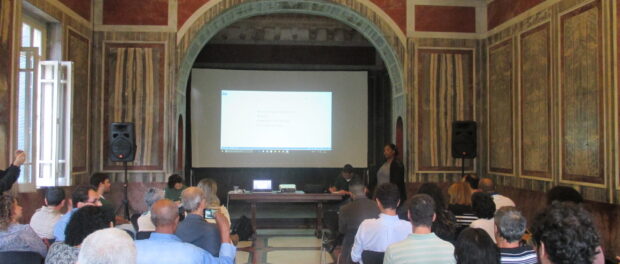
On Tuesday, May 24 supporters of the nearly 80-year-old Hípica community met in Parque Lage to dialogue with Tijuca Park staff about the future of their community. The meeting began somewhat tense as Ernesto Viveiros de Castro, the Director of Tijuca National Park, acknowledged that there have been longstanding tensions between residents and Park administration. Efforts were made to ensure that discussions were succinct and respectful among the audience members, which included residents of Hípica as well as residents of Horto, Vila Autódromo, and Vale Encantado. There was also representation from various governmental and non-governmental organizations such as the Institute of National Historical and Artistic Heritage (IPHAN) and the Inter-Religious Movement of Rio de Janeiro (MIR).
Roberta Leocádio, responsible for the territorial consolidation of the Park, and Ernestro Castro, Director of the Park, began the meeting with PowerPoint presentations of Tijuca Park’s history with Hípica and its stance on housing within the confines of the Park. The Park representatives blamed the current conflicts on past Park management—acknowledging that while past administrations might have been tolerant of communities like Hípica, new administrators were no longer willing to be. The Director also denied that the Park was specifically targeting Hípica when they restricted several houses’ access to electricity three years ago when the electrical grid was upgraded. Community supporters have pointed out that restaurants in the area maintain electricity and there were also complaints about the construction of telecommunications towers—reasoning that these are worse for the environment than housing. Ernesto defended the Park’s actions by noting that according to the Park’s regulations, there must be restaurants in the Park while there is no such mandate for allowing housing. Ernesto also maintained that the Park was also against these new developments.
The immediate response after the presentation was frustration. Marcello Deodoro, a social activist, expressed his anger that nothing in the presentation talked of human rights and that he was “ashamed” of the Park’s administration’ lack of respect towards Hípica residents. To highlight the human side of the issue, the president of the Association of Friends and Residents of Alto da Boa Vista that includes Vila Hípica, Otávio Barros, spoke of two elderly residents who have died as a result of the cuts to electricity. Luci Rosa de Alcomtona presented the eviction notice and medical documents of her late father, telling the audience that his health deteriorated without access to electricity. Challenging the longstanding assertion that communities like Hípica lead to environmental degradation and so therefore ought to be removed, Luci told the attentive audience that even though “no one deforests,” they are kept without light.
At the moment, the case of Hípica is tied up in what Ernesto called a “judicial imbroglio.” Some audience members expressed their lack of faith in the judicial system. City Councilman Reimont stated that the judge assigned to the case doesn’t understand the lives of common people while another audience member held that if the court upholds the eviction of Hípica, any application of the law would be an “application of justice that isn’t just.”
Despite a tense discussion, the meeting ended on a positive note. Bettino Zanini from the Association of Friends and Residents of the Botanical Gardens (AMAJB), suggested having attendees, including the Park representatives present, send a protest letter that demands the electricity in Hípica be turned back on, to be sent to the office of the attorney general directly. Those concerned hope to have a response from the Park within one week.



